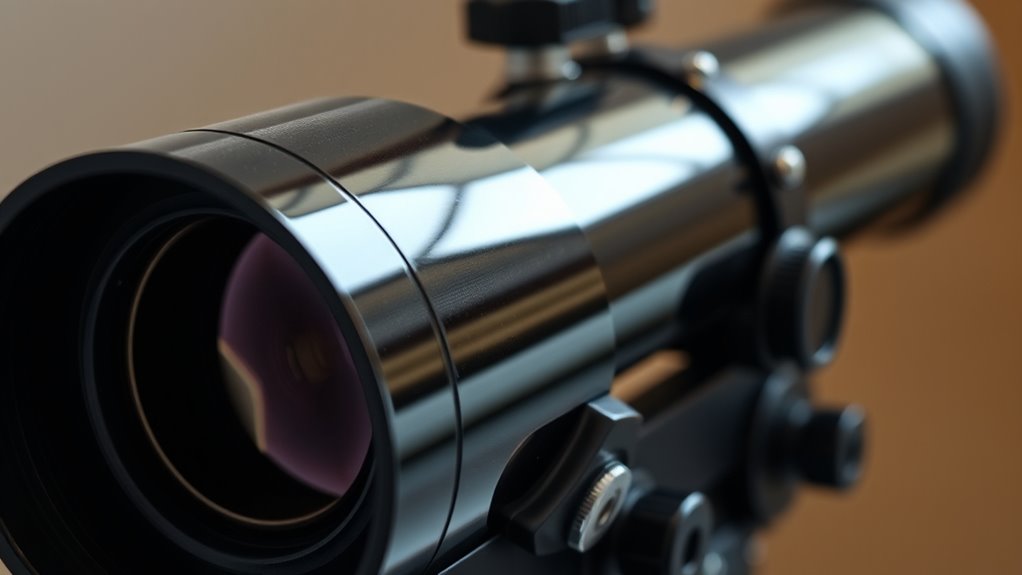If you’re looking for the best 2-inch apochromatic refractors that deliver stunning clarity, I recommend models with high-quality optics, minimal chromatic aberration, and solid build quality. These telescopes feature expertly matched glass elements, multi-layer coatings, and precise focusing mechanisms to guarantee sharp, bright images for both visual and astrophotography use. To find the perfect fit for your needs, I’ve compiled a list of top options that combine performance and portability — keep exploring to learn more.
Key Takeaways
- High-quality apochromatic lenses with ED glass or fluorite minimize chromatic aberration for sharp, true-color images.
- Apertures ranging from 90mm to 127mm gather ample light for detailed planetary and deep-sky observations.
- Advanced multi-layer coatings and matte interiors enhance contrast, brightness, and image clarity across the field.
- Precise dual-speed focusers support fine adjustments for both visual viewing and astrophotography.
- Durable, portable build designs ensure stable, effortless setup for stunning, clear celestial views.
Sky-Watcher EvoStar 100 APO Refractor Telescope
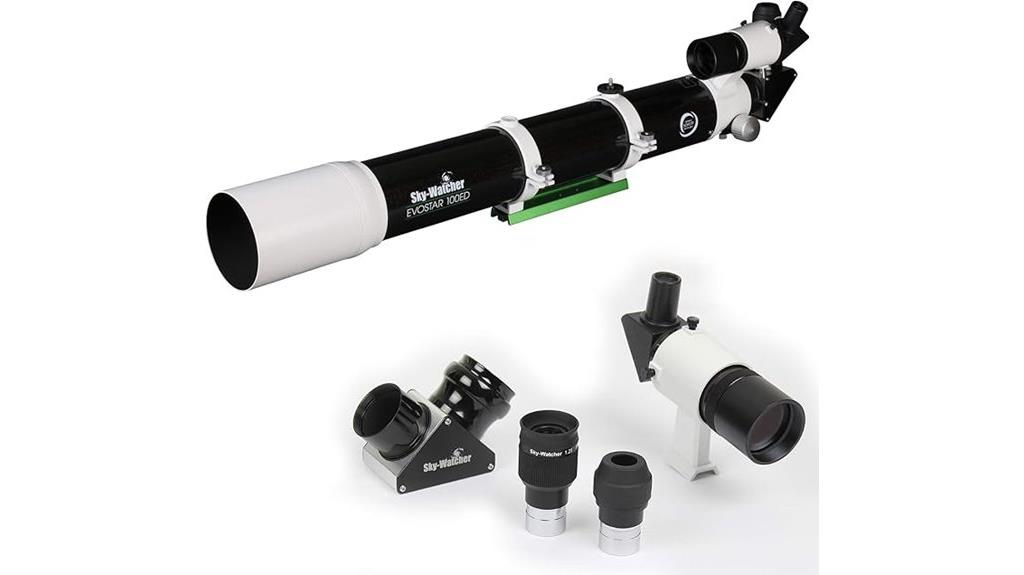
If you’re looking for an apochromatic refractor that offers exceptional optical performance without breaking the bank, the Sky-Watcher EvoStar 100 APO Refractor is an excellent choice. Its expertly matched doublet lenses, including synthetic fluorite and low-dispersion glass, deliver bright, sharp images with minimal aberrations. The scope’s high-transmission coatings and matte black interior improve contrast and eliminate false color. Lightweight and easy to handle, it’s ideal for both beginners and experienced astronomers. The included accessories, like the dual-speed focuser and wide-field eyepieces, make setup quick and observation smooth. Overall, it’s a versatile, portable scope that offers impressive visual and astrophotography results at a great price.
Best For: amateur astronomers and astrophotographers seeking a portable, high-quality refractor with excellent optical performance at an affordable price.
Pros:
- Expertly matched doublet lenses with synthetic fluorite and low-dispersion glass for minimal aberrations and sharp images
- Lightweight and portable design, weighing approximately 8.4 pounds, ideal for field use and quick setup
- Includes high-quality accessories such as dual-speed Crayford focuser, wide-field eyepieces, and sturdy carrying case
Cons:
- The finderscope is not illuminated, which may be less convenient for low-light observations
- Some users desire additional accessories like an illuminated reticle or better mounting options for astrophotography
- Limited to 100mm aperture, which may be less suitable for deep-sky imaging compared to larger telescopes
SVBONY SV503 Refractor Telescope, 102mm F7
https://m.media-amazon.com/images/I/51XqFFmO-sL.__AC_SY300_SX300_QL70_FMwebp_.jpg
The SVBONY SV503 Refractor Telescope stands out as an excellent choice for amateur astronomers and astrophotographers seeking sharp, wide-field views without breaking the bank. Its 102mm objective lens and F7 focal ratio produce bright, detailed images with minimal chromatic aberration thanks to the S-FPL51 ED glass doublet. The scope’s multi-layer coatings enhance light transmission, delivering crisp visuals of planets, deep-sky objects, and nebulae. Its solid build includes a smooth dual-speed focuser, retractable dew shield, and adjustable tube rings, making it portable and easy to handle. Overall, it offers impressive optical performance at an accessible price point, earning high user ratings.
Best For: amateur astronomers and astrophotographers seeking a portable, high-quality refractor for wide-field viewing and detailed imaging without a hefty price tag.
Pros:
- Excellent optical performance with minimal chromatic aberration thanks to S-FPL51 ED glass doublet
- Smooth dual-speed focuser allows precise focusing and easy adjustments
- Solid build quality with adjustable tube rings and retractable dew shield enhances portability and ease of use
Cons:
- Initial focuser backlash may require adjustment for optimal performance
- Lack of included manual or warranty documentation can make setup and support less straightforward
- No built-in storage case, requiring third-party solutions for transportation and storage
SVBONY SV550 APO Telescope Bundle
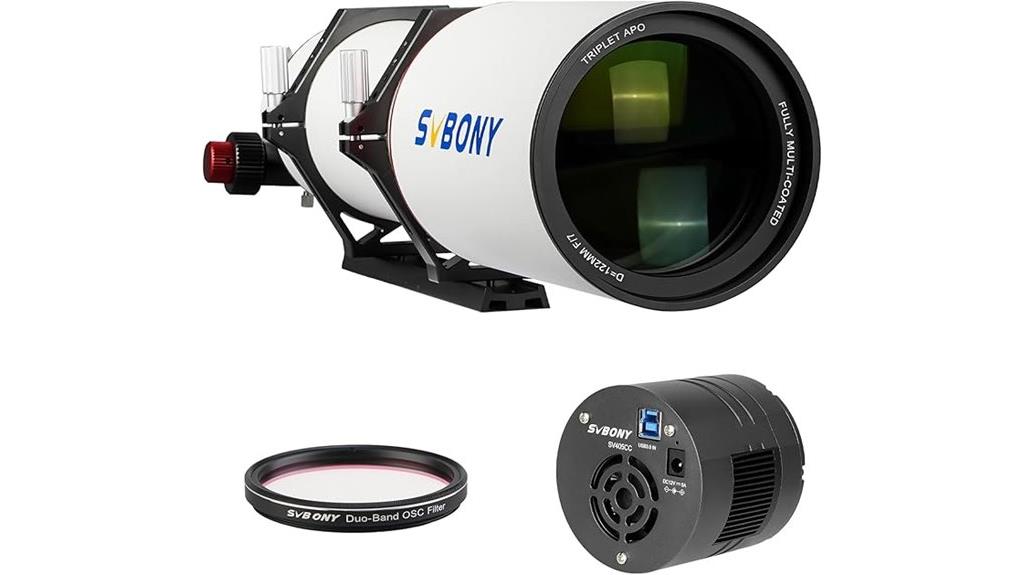
For amateur astronomers and astrophotographers seeking a portable yet powerful refractor, the SVBONY SV550 APO Telescope Bundle offers an impressive combination of optical quality and versatile features. Its 122mm FPL-51 triplet apochromatic lens reduces chromatic aberration and delivers sharp, detailed images. The lightweight design, weighing just over 6 kg, makes it ideal for travel and field use. It excels in deep sky imaging, especially with the bundled cooled color camera and dual-band nebula filter, which markedly enhance faint object visibility and contrast. This bundle provides a compact, high-performance setup for both observation and astrophotography enthusiasts.
Best For: amateur astronomers and astrophotographers seeking a portable, high-quality refractor for deep sky observation and imaging.
Pros:
- Exceptional optical quality with FPL-51 triplet apochromatic lens for sharp, detailed images.
- Lightweight and compact design, ideal for travel and field use.
- Bundled with a cooled color camera and dual-band nebula filter to enhance faint object imaging and contrast.
Cons:
- Relatively high cost for beginners or casual users.
- Requires additional accessories for full astrophotography setup.
- Limited aperture compared to larger telescopes, which may impact viewing of very faint objects under light-polluted skies.
Sky-Watcher EvoStar 120 APO Refractor
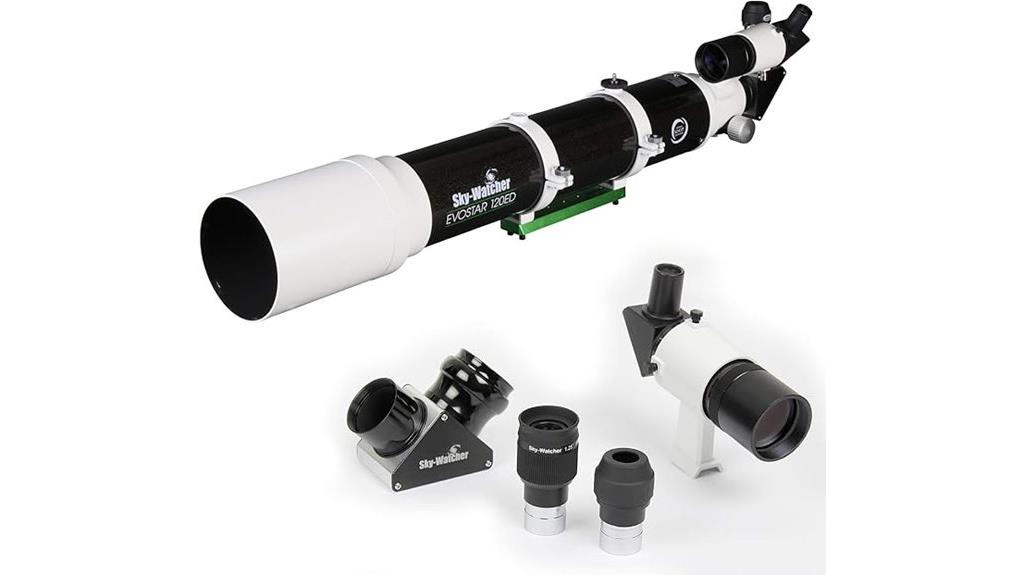
Apochromatic performance meets affordability with the Sky-Watcher EvoStar 120 APO Refractor, making it an excellent choice for amateur astronomers who want high-quality visuals and astrophotography capabilities without breaking the bank. Its expertly matched lenses, including synthetic fluorite, minimize false color and aberrations, delivering sharp, detailed images. The doublet design offers a lighter, more budget-friendly alternative to triplets, with a 120mm aperture and 900mm focal length ideal for planetary, lunar, deep-sky, and astro imaging. Built from durable rolled steel, it includes essential accessories like a dual-speed focuser, finderscope, and transport case, ensuring ease of use and portability.
Best For: amateur astronomers seeking a portable, high-quality refractor for visual observation and astrophotography on a budget.
Pros:
- Excellent color correction and sharp images due to expertly matched lenses and coatings
- Lightweight and compact design for easy transport and versatile use
- Comes with comprehensive accessories including a dual-speed focuser and transport case
Cons:
- Doublet design may have limitations in extreme astrophotography compared to triplet refractors
- Slightly less optimal for high-magnification planetary detail compared to more advanced scopes
- Mount compatibility may be limited due to its lightweight, smaller size
SVBONY SV503 Refractor Telescope Kit
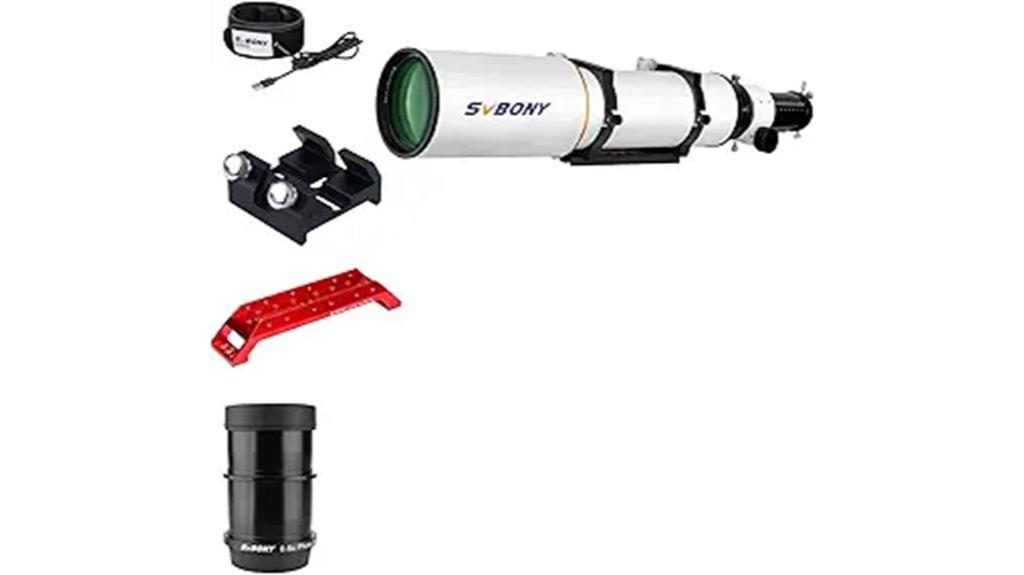
Looking for a versatile refractor telescope that combines bright image quality with portability? The SVBONY SV503 Refractor Telescope Kit fits the bill perfectly. It features a 102mm objective lens with an f/7 focal ratio, delivering bright, clear images ideal for both observation and astrophotography. The kit includes a 0.8x focal reducer and field flattener, suitable for full-frame photography and compatible with popular brands like Celestron, Orion, Sky-Watcher, and Vixen. Its built-in aluminum film surface prevents dew and fog, while the portable handle and SV211 dovetail base make transportation effortless. This setup focuses on user convenience and stellar image quality.
Best For: amateur astronomers and astrophotographers seeking a portable, high-quality refractor telescope for daytime observation and night sky imaging.
Pros:
- Bright, clear images with a large 102mm objective lens and f/7 focal ratio
- Includes a 0.8x focal reducer and field flattener for full-frame photography
- Built-in dew prevention features and portable design with handle and dovetail base
Cons:
- May require additional accessories for advanced astrophotography setups
- Slightly heavier compared to smaller, more compact models
- Compatibility limited to certain brands for accessories and mounts
Gskyer Telescope 600x90mm AZ Astronomical Refractor Telescope
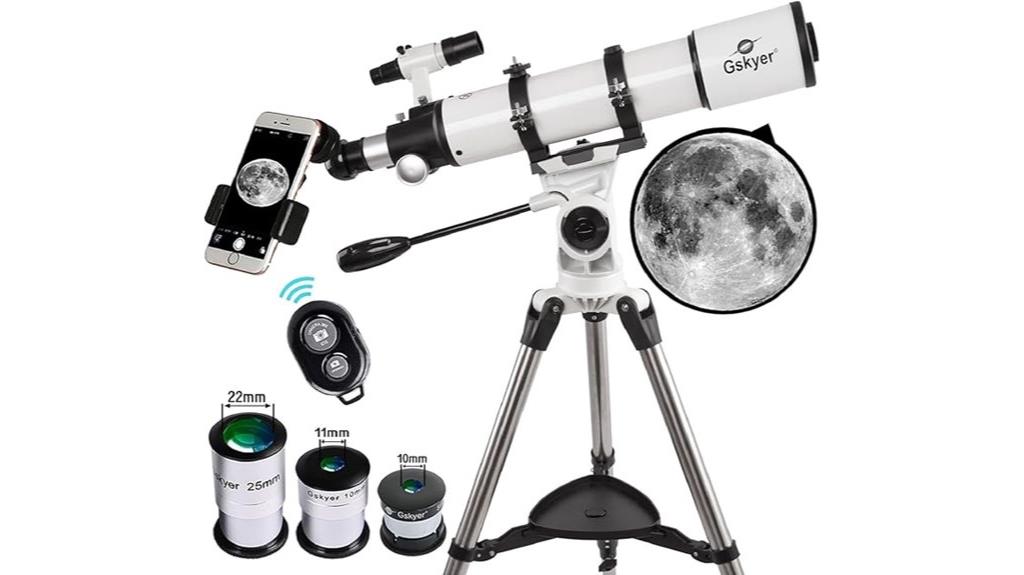
The Gskyer 600x90mm AZ Astronomical Refractor Telescope stands out with its versatile magnification options, making it ideal for beginners enthusiastic to explore the night sky. Its 600mm focal length and 90mm aperture produce sharp, bright images, thanks to fully coated optics glass lenses. With three replaceable eyepieces—24X, 60X, and 120X—and a 3x Barlow lens, it offers flexible zoom levels for different objects. The adjustable aluminum tripod, from 31.5 to 49 inches, supports comfortable viewing. Setup requires no tools, and focusing is quick and straightforward. Plus, it includes friendly customer support and a 12-month warranty, making it a reliable starter telescope.
Best For: Beginners and amateur astronomers seeking an easy-to-use, versatile telescope for exploring the night sky.
Pros:
- Easy setup with no tools required, ideal for beginners
- Multiple magnification options with interchangeable eyepieces and Barlow lens for flexible viewing
- Adjustable tripod height supports comfortable viewing positions
Cons:
- Limited to 600x maximum magnification, which may not suit advanced astronomical observations
- No motorized tracking or computerized features included
- Small aperture size (90mm), which may limit viewing of faint deep-sky objects
Omegon Apochromatic Refractor Pro APO AP Photography Scope 72/432 ED OTA
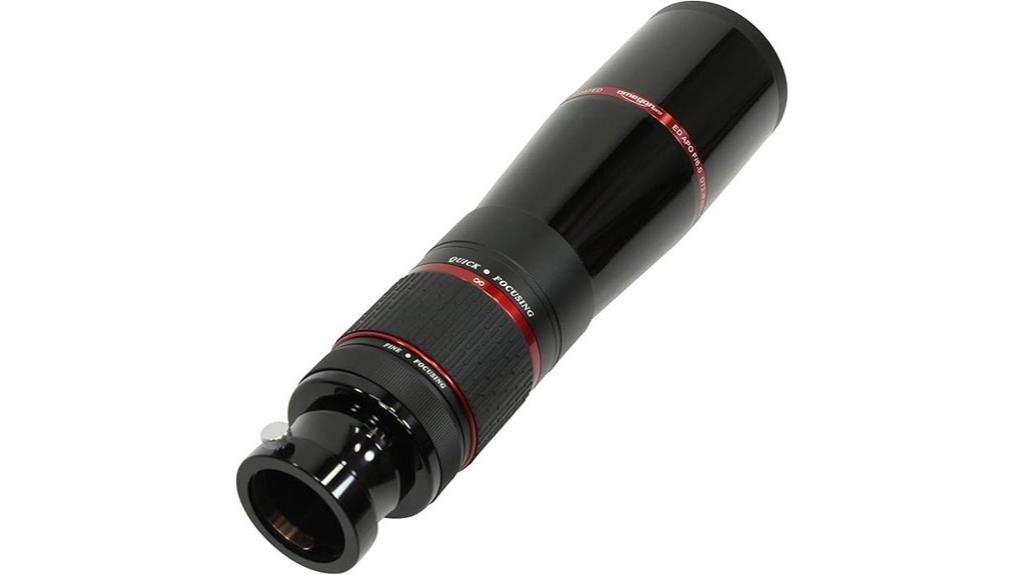
If you’re searching for a versatile telescope that seamlessly changeovers between astrophotography, terrestrial observation, and casual spotting, the Omegon Apochromatic Refractor Pro APO AP Photography Scope 72/432 ED OTA is an excellent choice. It combines a telescope, spotting scope, and telephoto lens into one compact, portable unit. Its high-quality apochromatic optics, featuring ED glass and a green-shimmering coating, deliver sharp, high-contrast images of the moon, stars, birds, and landscapes. With a 432 mm focal length and easy mounting options, it’s perfect for quick setup and versatile use. Whether for astrophotography or nature watching, this scope offers impressive clarity and adaptability.
Best For: outdoor enthusiasts, amateur astronomers, and nature lovers seeking a versatile, portable optical instrument for astrophotography, birdwatching, and terrestrial observation.
Pros:
- Combines telescope, spotting scope, and telephoto lens into one compact, multi-functional device
- High-quality apochromatic optics with ED glass and green-shimmering coating for sharp, high-contrast images
- Easy to mount and quick to set up on various tripods or mounts, ideal for rapid outdoor use
Cons:
- Relatively heavy at approximately 10.34 pounds, which may affect portability for some users
- Limited aperture size, which might restrict deep-sky astrophotography compared to larger telescopes
- Requires compatible accessories (filters, reducers, mounts) for full versatility, adding to overall cost
SVBONY SV48P Telescope, 90mm Aperture F5.5 Refractor OTA
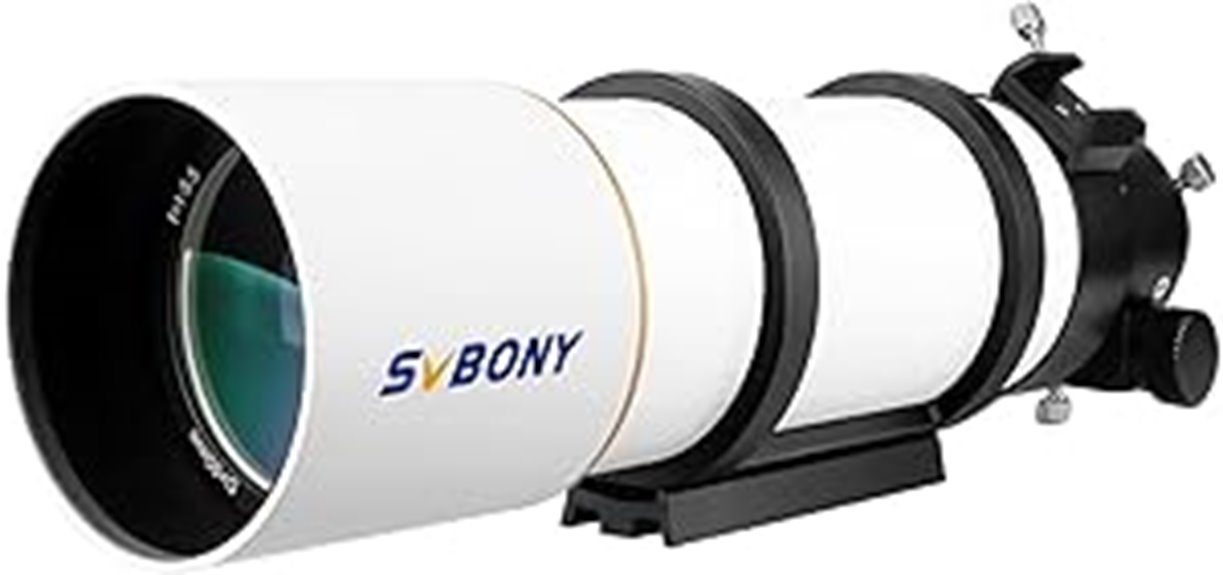
For beginners and amateur astronomers seeking a versatile, high-quality refractor, the SVBONY SV48P Telescope with its 90mm aperture and F5.5 focal ratio stands out. It provides more light and a wider field of view than smaller scopes, making it ideal for moon and deep-sky observing. The scope features a double-speed rotatable focuser with 1:10 gear ratio for precise adjustments, plus a fully multilayer green-coated lens that reduces false color and enhances clarity. Its lightweight design (around 6.6 pounds) and solid build make it portable and easy to handle. Overall, the SV48P combines good optical performance with user-friendly features, making it a valuable choice for beginners and casual astronomers.
Best For: beginner and amateur astronomers seeking a versatile, high-quality refractor for moon, planets, and deep-sky observation.
Pros:
- Excellent light gathering and wide field of view for enhanced observation experience
- Precise double-speed rotatable focuser with smooth operation and easy adjustments
- Compact, lightweight design making it portable and suitable for quick setup
Cons:
- Focuser may feel slightly stiff or gritty for some users
- Slight chromatic aberration in some models, especially under high magnification
- Minor issues like paint chipping have been reported but do not affect overall performance
Omegon Focuser Newton Hybrid Crayford Dual Speed 2
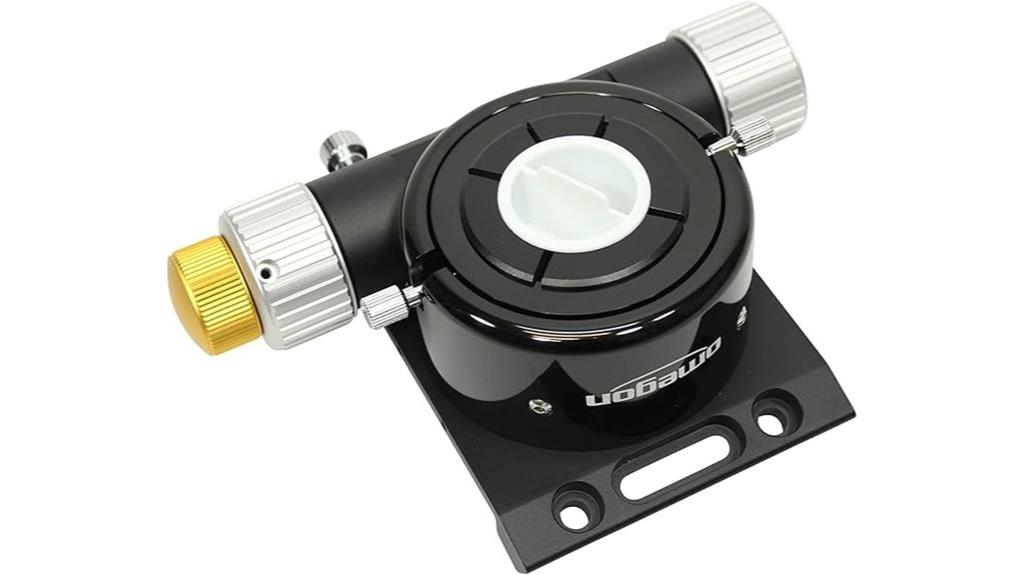
Designed for astronomers who demand precise and backlash-free focusing, the Omegon Focuser Newton Hybrid Crayford Dual Speed 2 stands out with its smooth dual-speed mechanism and robust build quality. Its low-profile design, just 50mm high, makes focusing easy, even with heavy accessories like SLRs and large 2-inch eyepieces. The Tiger Crayford mechanism, with roller ball bearings, guarantees smooth, backlash-free operation and stable focus. The dual-speed planetary gear offers fine adjustments with a 1:11 ratio, perfect for high-magnification viewing. Lightweight yet durable, it supports loads up to 8kg, making it a reliable upgrade for serious amateur astronomers.
Best For: amateur astronomers and astrophotographers seeking precise, backlash-free focusing with the ability to handle heavy accessories on their Newtonian telescopes.
Pros:
- Smooth dual-speed mechanism with a 1:11 gear ratio for fine, precise adjustments
- Backlash-free operation thanks to roller ball bearings in the Tiger Crayford system
- Supports heavy loads up to 8kg, suitable for large eyepieces and cameras
Cons:
- Installation may require drilling or additional adapters to fit certain telescope models
- Heavier than factory focusers, which could affect balance and handling
- Some users have reported fitting issues or the need for modifications during setup
Telescopes for Astronomy Adult, 127ED Professional Astronomical Telescope
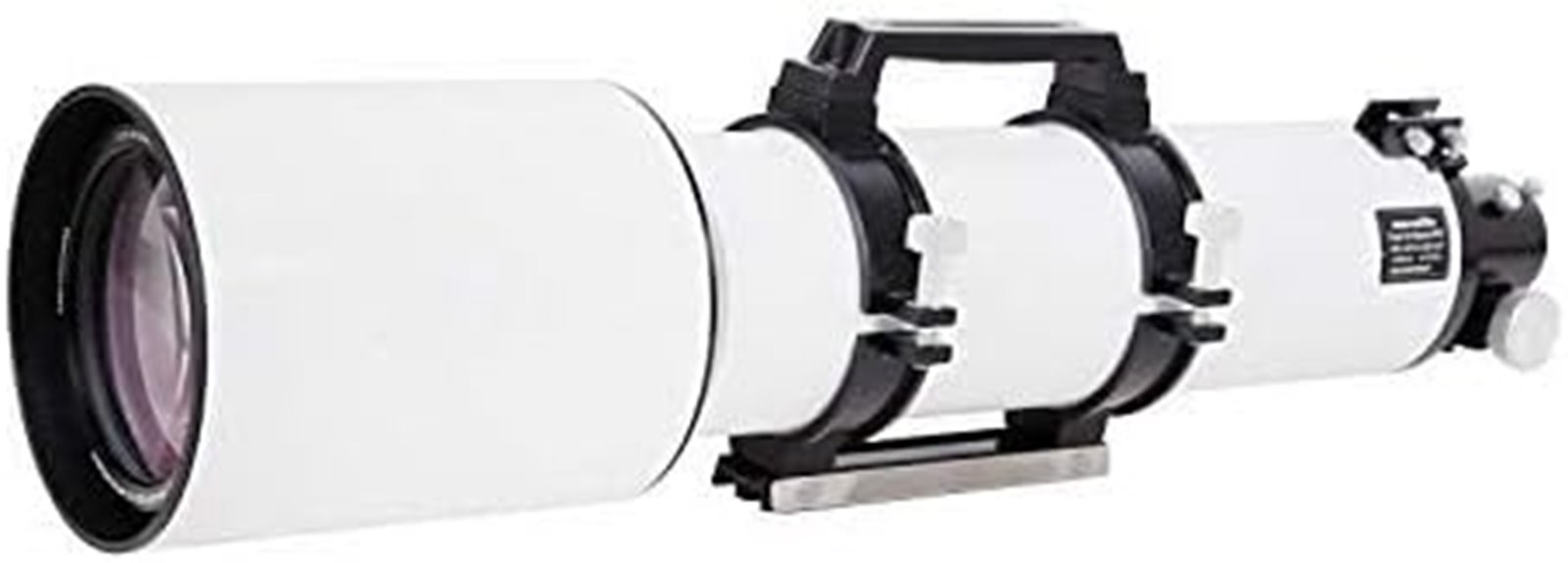
The Telescopes for Astronomy Adult, 127ED Professional Astronomical Telescope OTA stands out for its high-quality apochromatic refracting lens, which delivers sharp, colorful images with minimal chromatic aberration. Its 127mm aperture and 950mm focal length provide bright, detailed views of celestial objects. The multilayer antireflection coating enhances image clarity, while the precise focusing tube with a scale and a two-speed focusing wheel makes targeting and tracking objects effortless. The included tripod offers stability for both visual observation and astrophotography. Overall, this telescope combines high performance with user-friendly features, making it an excellent choice for serious amateur astronomers.
Best For: serious amateur astronomers seeking high-quality, sharp, and colorful celestial imaging with user-friendly focusing features.
Pros:
- High-quality apochromatic lens minimizes chromatic aberration for clearer images
- Large 127mm aperture and 950mm focal length provide bright, detailed views of celestial objects
- Two-speed focusing wheel and scale enable precise and quick focus adjustments for astrophotography
Cons:
- May be heavier and bulkier due to high-quality construction and included tripod
- Requires some familiarity with telescope setup and focusing for optimal use
- Higher price point compared to entry-level telescopes
SVBONY SV550 APO Telescope Bundle
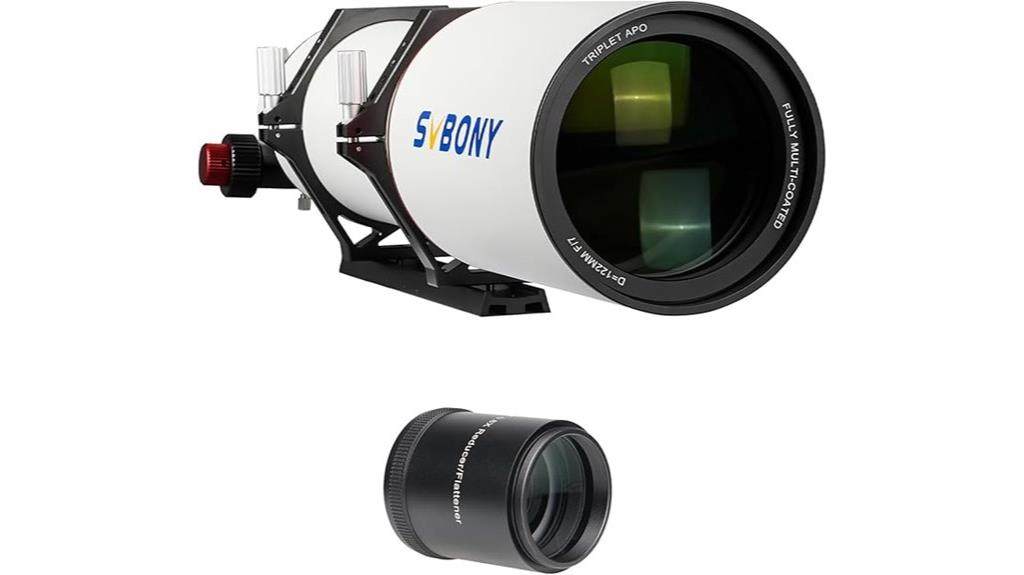
If you’re seeking a portable yet high-performance telescope for astrophotography and deep sky observation, the SVBONY SV550 APO Telescope Bundle stands out as an excellent choice. Its compact design, weighing just over 6.4kg, makes it easy to transport and set up anywhere. The 122mm FPL-51 triplet apochromatic lens ensures sharp, detailed images with minimal chromatic aberration, perfect for capturing faint celestial objects. The included SV209 0.8X focal reducer and field flattener improve image quality by reducing distortions at the edges. This bundle offers a complete, versatile setup for amateur astronomers enthusiastic to explore deep sky wonders with stunning clarity.
Best For: amateur astronomers and astrophotography enthusiasts seeking a portable, high-quality telescope for deep sky observation and imaging.
Pros:
- Compact and lightweight design for easy transport and setup
- Equipped with a high-quality FPL-51 triplet apochromatic lens for sharp, color-accurate images
- Includes a field flattener and focal reducer to enhance image quality and reduce distortion
Cons:
- May require additional accessories or mounts for full functionality
- Slightly heavier than some ultra-compact travel telescopes, which could impact portability for some users
- Optimal performance depends on proper alignment and calibration, which may have a learning curve for beginners
Askar 80ED Telescope (80mm F7, 560mm, ED Glass Refractor)
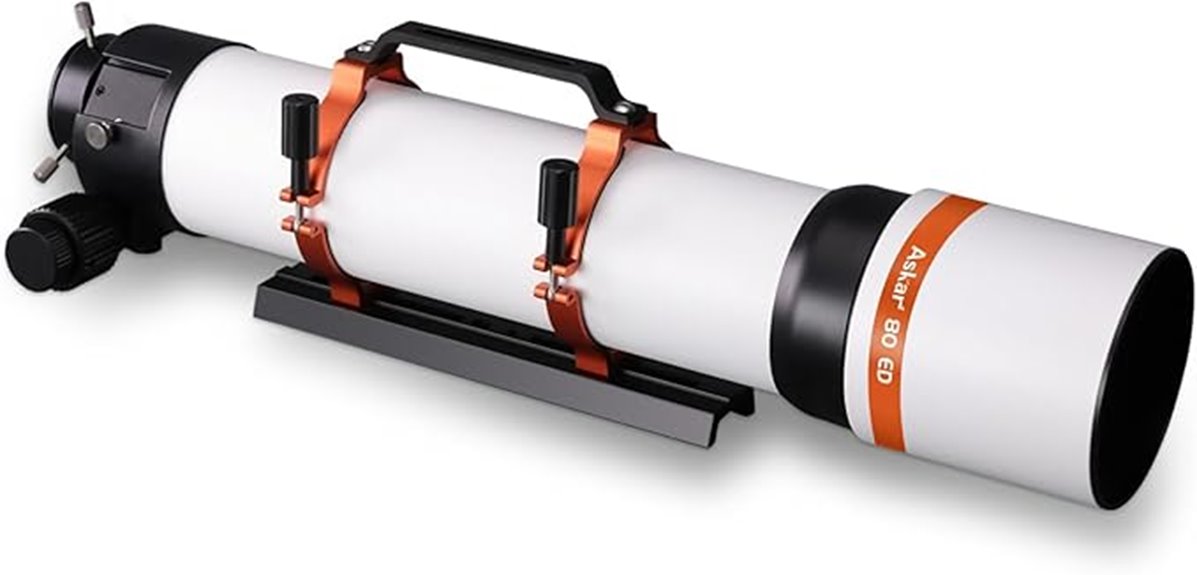
Astronomers seeking a compact, high-quality refractor for astrophotography and detailed celestial observation will find the Askar 80ED Telescope an excellent choice. Its 80mm aperture and F7 focal ratio deliver sharp, high-contrast images, enhanced by ED glass that minimizes chromatic aberration. The telescope features a retractable lens hood and dual baffles for stray light suppression, ensuring clearer views. The dual-speed 2-inch focuser provides precise focusing, ideal for astrophotography. Compatibility with APS-C and full-frame cameras, along with optional reducers and flatteners, makes it versatile. Its lightweight design, sturdy tube ring, and Vixen-style dovetail allow easy mounting on most equatorial mounts.
Best For: Amateur and professional astronomers seeking a portable, high-performance refractor for astrophotography and detailed celestial observation.
Pros:
- High-quality ED glass minimizes chromatic aberration, delivering sharp, high-contrast images.
- Dual-speed focuser allows precise control for astrophotography and fine observing details.
- Compatibility with APS-C and full-frame cameras, plus optional reducers and flatteners, increases versatility.
Cons:
- The telescope’s premium features and accessories may come at a higher price point.
- Requires additional mounting accessories for optimal setup on some mounts.
- Slightly limited aperture size compared to larger telescopes, which may restrict deep-sky viewing.
SVBONY SV555 Telescope, Astrophotography Refractor (54mm APO)

For astrophotographers seeking a portable yet high-quality refractor, the SVBONY SV555 stands out with its 54mm APO triplet lens that delivers sharp, aberration-free images across full-frame sensors. Its lightweight design and optimized lens hood enhance portability and protection. The telescope features smooth manual focus, lockable aperture rings, and compatibility with electric focusers, ensuring precise adjustments. Supporting a variable aperture from F4.5 to F22, it suits diverse astrophotography needs. With minimal vignetting and high image quality, the SV555 is ideal for wide-field imaging. Its versatile mounting options and included accessories make setup quick, appealing to both beginners and experienced users.
Best For: amateur and experienced astrophotographers seeking a portable, high-quality refractor for wide-field imaging across full-frame sensors.
Pros:
- High-quality 54mm APO triplet lens delivers sharp, aberration-free images with minimal vignetting
- Lightweight and portable design with optimized lens hood for easy transportation and protection
- Supports variable aperture from F4.5 to F22 and compatibility with electric focusers for precise adjustments
Cons:
- Focus could be challenging without using a 2-inch filter due to slightly longer back focus requirements
- Some users report stiffness issues with mounts when using focus motors or guide scopes
- Custom modifications may be necessary for fitting additional focus motors like Gemini
Omegon Steeltrail 2 Newtonian Dual Speed Crayford focuser
https://m.media-amazon.com/images/I/71rdaff8F4L.__AC_SX300_SY300_QL70_FMwebp_.jpg
The Omegon Steeltrail 2 Newtonian Dual Speed Crayford focuser stands out as a top upgrade for serious amateur astronomers seeking precise focus control. Made from durable stainless steel, it offers long-lasting performance and stability, even under heavy loads up to 5kg. Its 1:10 reduction gearing allows for highly accurate adjustments, essential for detailed astrophotography. The short optical length simplifies setup, while stainless steel ball bearings ensure smooth, reliable operation over time. Compatible with Skywatcher models via an adapter, this focuser markedly enhances telescope performance, providing crisp, sharp images and effortless focusing—making it an excellent investment for those demanding precision.
Best For: amateur astronomers and astrophotographers seeking precise, durable focusing upgrades for their Newtonian telescopes.
Pros:
- Made from durable stainless steel ensuring long-lasting performance and stability
- Equipped with 1:10 reduction gearing for highly precise focus adjustments
- Supports accessories up to 5kg, suitable for heavy setups and astrophotography
Cons:
- Slightly heavier than standard focusers, which may affect balance for some telescopes
- Minor markings issue, showing only 8 divisions per centimeter instead of 10
- Requires an adapter for compatibility with Skywatcher models, adding an extra step for some users
SVBONY SV550 APO Telescope for Adults
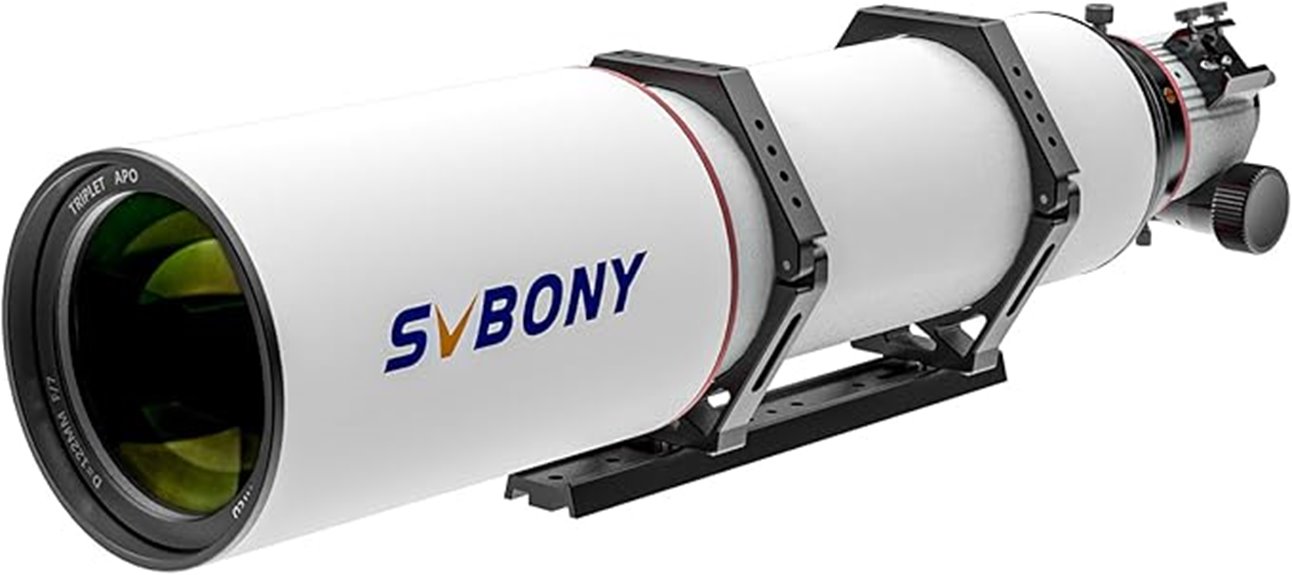
Looking for a high-quality refractor that combines portability with exceptional optical performance? The SVBONY SV550 APO Telescope for Adults fits the bill perfectly. It features a 122mm aperture and F7 focal ratio, providing bright, sharp images of deep sky objects and planets. Its FPL-51 triplet lens with ED glass minimizes chromatic aberration, delivering high contrast and pinpoint star images. The dual-speed 2.5-inch focuser ensures precise focusing, even with heavy cameras. Compact and lightweight at just over 14 pounds, it’s easy to carry and set up. Whether for astrophotography or visual observation, the SV550 offers excellent value and reliable performance.
Best For: amateur astronomers and astrophotographers seeking a portable, high-quality APO refractor for both visual observation and deep sky imaging.
Pros:
- Superior optical quality with a FPL-51 triplet apochromatic lens that minimizes chromatic aberration
- Compact, lightweight design making it highly portable and easy to transport
- Dual-speed 2.5-inch focuser provides precise focusing support for heavy cameras and accessories
Cons:
- Slight issues with dust between lens elements reported by some users
- Support for parts and accessories can be inconsistent, leading to difficulties in replacement or upgrades
- Limited to medium-capacity mounts, which may restrict some heavier setups
Factors to Consider When Choosing a 2 Inch Apochromatic Refractor
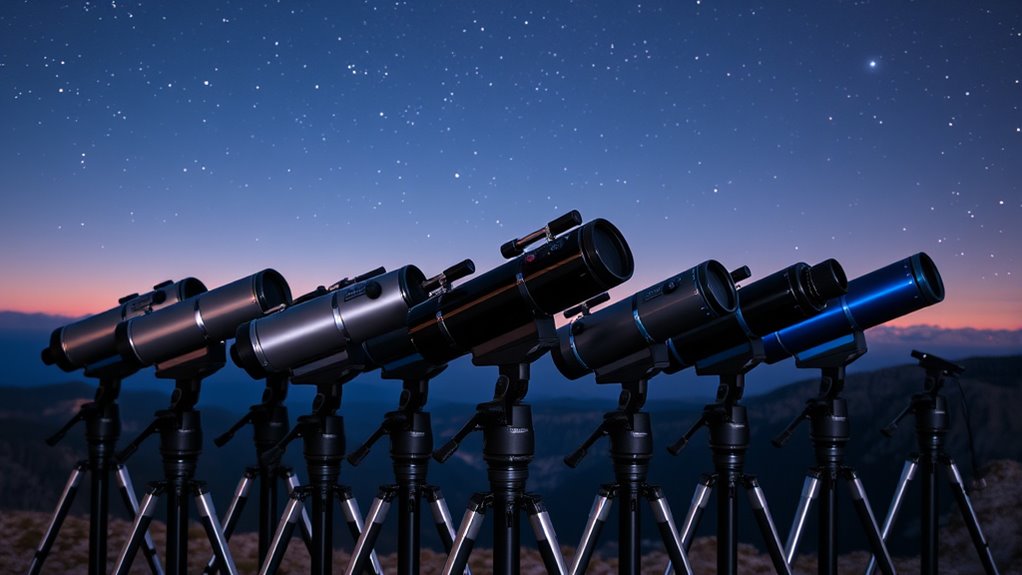
When choosing a 2-inch apochromatic refractor, I focus on optical quality, including the glass and coatings, to guarantee sharp images. I also consider the aperture and focal length to match my observing needs, along with the build quality and portability. Finally, I check the focusing mechanisms and accessory compatibility to make setup and upgrades seamless.
Optical Quality and Glass
Choosing a high-quality 2-inch apochromatic refractor hinges largely on the type and quality of glass used in its lenses. ED (Extra Low Dispersion) and fluorite elements are essential for reducing chromatic aberration, resulting in sharper, more color-accurate images. Many top models use triplet or quadruplet lens designs, which better minimize color fringing and enhance overall image clarity across the entire field of view. The homogeneity of the glass and its precise polishing are vital, directly impacting contrast, resolution, and sharpness. Multi-layer coatings on the lens surfaces further improve light transmission and reduce reflections, boosting contrast and detail. Ultimately, the choice of glass and lens construction determines how well the refractor handles pinpoint stars, crisp planetary details, and false color minimization.
Aperture and Focal Length
Have you considered how aperture and focal length directly impact the performance of a 2-inch apochromatic refractor? Larger apertures, like 122mm or 127mm, gather more light, resulting in brighter, more detailed images of celestial objects. Longer focal lengths, such as 900mm or 950mm, provide higher magnification and better resolution, ideal for planetary and lunar viewing. The focal ratio, whether f/6.7 or f/7, influences the field of view and image brightness; lower ratios offer wider views, while higher ratios deliver more magnification. Matching aperture and focal length carefully enables you to resolve fine details without excessive chromatic aberration. Striking the right balance ensures ideal performance while keeping the telescope manageable in size and weight.
Build and Portability
A well-built 2-inch apochromatic refractor should be both compact and lightweight, making it easy to carry and set up in a variety of observing locations. Durable materials like aluminum or stainless steel enhance the scope’s longevity and resist environmental stress. A sturdy mounting system with adjustable rings and a reliable dovetail plate ensures stability during observations or astrophotography. Many models include protective cases or foam-lined storage, simplifying transportation and safeguarding against damage. The overall build quality, including smooth focusing mechanisms and sealed optical tubes, plays a vital role in reliable field performance. When considering portability, balance between weight, robustness, and ease of setup is key. A well-designed scope allows for quick assembly and confident handling wherever your stargazing takes you.
Focusing Mechanisms
When selecting a focusing mechanism for a 2-inch apochromatic refractor, precision and smooth operation are essential. Dual-speed focusers, like 10:1 or 11:1 ratios, let me make fine adjustments, which is vital for high-magnification astrophotography. Rack-and-pinion focusers offer smooth, backlash-free movement, helping me maintain sharp images during delicate tweaks. Crayford-style focusers, with roller bearings, provide backlash-free action and stability, reducing image shift. I also look for a sufficient focus travel range to accommodate accessories such as cameras and filters, ensuring versatility. For added convenience, electronic or motorized focusers can greatly improve focusing speed and accuracy, especially when used with auto-focus systems or remote operation. These features make focusing more precise, efficient, and enjoyable.
Accessories Compatibility
Are you confident that your 2-inch apochromatic refractor’s focuser will support all your accessories comfortably? It’s vital to check compatibility with your existing mount and optical tube, ensuring the diameter and mounting holes match. The focuser should handle the weight and size of your accessories, like heavy eyepieces, cameras, or focal reducers, to prevent slippage or instability. Verify support for standard accessories such as 2-inch diagonal mirrors, filters, and adapters, which can greatly enhance versatility. Also, confirm that the mechanical interface and mounting hardware align with your telescope’s design for secure attachment and proper alignment. Ultimately, look for adjustments or adapters compatible with different brands and models to future-proof your setup and ensure seamless integration.
Price and Brand Value
Choosing the right 2-inch apochromatic refractor involves balancing price and brand reputation to get the best value. Higher-priced models often feature premium optical elements like FPL-53 or fluorite glass, which boost image quality but come at a higher cost. Established brands with strong reputations typically offer better quality control, consistent performance, and longer warranties, justifying their premium prices. Budget-friendly options may use simpler coatings or glass types, resulting in slightly lower contrast and color correction, yet still suitable for amateur astronomers. Additionally, a reputable brand’s customer support, replacement parts, and accessories add long-term value. Ultimately, investing in a well-known brand ensures reliability and peace of mind, making it a worthwhile choice for those seeking durability and stellar performance.
Frequently Asked Questions
How Do Apochromatic Refractors Improve Image Clarity Over Standard Lenses?
Apochromatic refractors improve image clarity by reducing chromatic aberration, which causes color fringing and blurry edges in images. I’ve found that their special lens design brings in multiple wavelengths of light and focuses them precisely, resulting in sharper, more accurate images. This means I can see finer details and vibrant colors without the distracting halos or distortions common with standard lenses, making my viewing experience much clearer and more enjoyable.
What Maintenance Is Required for 2-Inch Apochromatic Refractors?
Think of your 2-inch apochromatic refractor as a delicate gemstone needing care. I regularly clean the lenses with a soft brush and lens cleaning solution to keep images sharp. I also check for dew buildup and use a dew shield when necessary. Keep the mount and tripod sturdy, and store the telescope in a dust-free, dry place. Proper maintenance guarantees it stays a stunning window to the universe.
Are These Telescopes Suitable for Beginner Astronomers?
Yes, I believe these telescopes are great for beginners. They’re relatively easy to set up and use, offering clear, sharp images that inspire confidence. Plus, their high-quality optics mean you won’t outgrow them quickly. I’ve found that with a bit of patience, even newcomers can enjoy stunning views of planets and stars. Just start with simple targets, and you’ll quickly appreciate their impressive performance and clarity.
How Does Aperture Size Affect Astrophotography Quality?
Sure, bigger aperture means better astrophotography—think of it as giving your camera more megapixels. It captures more light, revealing fainter stars and intricate details. But beware: larger apertures also mean heftier equipment and pricier setups. So, if you’re serious about capturing the cosmos, go big. Otherwise, keep it modest and enjoy your stargazing without turning into a telescope-hugging weightlifter.
Can These Refractors Be Used for Terrestrial Viewing as Well?
Absolutely, these refractors are great for terrestrial viewing too! I’ve found that their crisp optics and high contrast make land and wildlife observation incredibly detailed and enjoyable. Plus, the 2-inch aperture provides enough light gathering to see distant objects clearly, whether it’s mountain ranges or birds. They’re versatile tools that excel both in astronomy and daytime use, making them a smart investment for all your viewing adventures.
Conclusion
Choosing the right 2-inch apochromatic refractor is like finding the perfect pair of glasses—once you do, everything becomes clearer and more vivid. I remember the first night I looked through my telescope, the stars seemed so close I could almost reach out and touch them. With the right instrument, you’ll see the universe in stunning detail, transforming your nights from ordinary to extraordinary. Trust me, the right scope makes all the difference.
